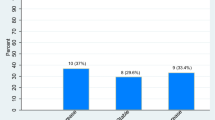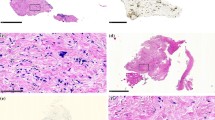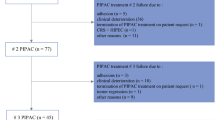Abstract
Introduction
Pressurized intraperitoneal aerosol chemotherapy (PIPAC) is a new surgical technique for the treatment of initially unresectable peritoneal carcinomatosis (PC). Our objective was to compare the results of PIPAC associated with systemic chemotherapy (PIPAC_CHEM) with those of systemic chemotherapy alone (ONLY_CHEM) in patients with gastric PC without metastasis other than peritoneal, and the WHO performance status < 3.
Methods
This was a retrospective, single center, comparative non-randomized study. Seventeen PIPAC_CHEM patients were compared to 29 ONLY_CHEM patients. The primary endpoint was overall survival at 6 months from diagnosis of PC.
Results
Ninety-eight patients were screened and 46 were included (PIPAC_CHEM, n = 17; ONLY_CHEM, n = 29). The PIPAC_ CHEM population was significantly younger (median 64 years [56; 68] vs 74 years [61; 79]; p = 0.0054). Median PIPAC session per patient is 2 [1–3]. Six-month survival was significantly higher in the PIPAC_CHEM group than in the ONLY_CHEM group 16/17 (94.1% [65–99.2]) vs 19/29 (65.5% [45.4–79.7]), respectively; p = 0.029. Over the entire follow-up, median survival [95% CI] was 12.8 months [7.2–34.3] with PIPAC vs 9.1 months [5.4–11.5] without, p = 0.056.
At 6 months, median length of additional hospitalization was significantly less for PIPAC_CHEM (median 2 days [2–7]) than without PIPAC (median 11 days [3–21]) (p = 0.045).
Conclusion
The overall survival at 6 months after the diagnosis of carcinomatosis was significantly better for PIPAC_CHEM patients. This difference appears to continue until at least 18 months. At 6 months, days of additional hospitalization was significantly less in the PIPAC_CHEM group.
Trial Registration
Clinicaltrials.gov Identifier: NCT 04,879,953




Similar content being viewed by others
Availability of Data and Material (Data Transparency)
Anonymized patient data will be made available on reasonable request for academic use after publication of the article and with a signed contract between the applicant and Grenoble Alpes University Hospital.
References
Bray F, Ferlay J, Soerjomataram I, Siegel RL, Torre LA, Jemal A. Global cancer statistics 2018: GLOBOCAN estimates of incidence and mortality worldwide for 36 cancers in 185 countries. CA Cancer J Clin. 2018;68:394–424.
Coccolini F, Cotte E, Glehen O, Lotti M, Poiasina E, Catena F, et al. Intraperitoneal chemotherapy in advanced gastric cancer. Meta-analysis of randomized trials. Eur J Surg Oncol. 2014;40:12–26.
Sadeghi B, Arvieux C, Glehen O, Beaujard AC, Rivoire M, Baulieux J, et al. Peritoneal carcinomatosis from non-gynecologic malignancies: results of the EVOCAPE 1 multicentric prospective study. Cancer. 2000;88:358–63.
Dehal A, Smith JJ, Nash GM. Cytoreductive surgery and intraperitoneal chemotherapy: an evidence-based review-past, present and future. J Gastrointest Oncol. 2016;7:143–57.
Franko J, Shi Q, Meyers JP, Maughan TS, Adams RA, Seymour MT, et al. Prognosis of patients with peritoneal metastatic colorectal cancer given systemic therapy: an analysis of individual patient data from prospective randomised trials from the Analysis and Research in Cancers of the Digestive System (ARCAD) database. Lancet Oncol. 2016;17:1709–19.
Bonnot P-E, Piessen G, Kepenekian V, Decullier E, Pocard M, Meunier B, et al. Cytoreductive surgery with or without hyperthermic intraperitoneal chemotherapy for gastric cancer with peritoneal metastases (CYTO-CHIP study): a propensity score analysis. J Clin Oncol. 2019;37:2028–40.
van Driel WJ, Koole SN, Sikorska K, Schagen van Leeuwen JH, Schreuder HWR, Hermans RHM, et al. Hyperthermic intraperitoneal chemotherapy in ovarian cancer. N Engl J Med. 2018;378:230–40.
Solaß W, Hetzel A, Nadiradze G, Sagynaliev E, Reymond MA. Description of a novel approach for intraperitoneal drug delivery and the related device. Surg Endosc. 2012;26:1849–55.
Khomyakov V, Ryabov A, Ivanov A, Bolotina L, Utkina A, Volchenko N, et al. Bidirectional chemotherapy in gastric cancer with peritoneal metastasis combining intravenous XELOX with intraperitoneal chemotherapy with low-dose cisplatin and Doxorubicin administered as a pressurized aerosol: an open-label, Phase-2 study (PIPAC-GA2). Pleura Peritoneum. 2016;1:159–66.
Nadiradze G, Giger-Pabst U, Zieren J, Strumberg D, Solass W, Reymond M-A. Pressurized Intraperitoneal Aerosol Chemotherapy (PIPAC) with Low-Dose Cisplatin and Doxorubicin in Gastric Peritoneal Metastasis. J Gastrointest Surg. 2016;20:367–73.
Alyami M, Bonnot P-E, Mercier F, Laplace N, Villeneuve L, Passot G, et al. Pressurized intraperitoneal aerosol chemotherapy (PIPAC) for unresectable peritoneal metastasis from gastric cancer. Eur J Surg Oncol. 2021;47:123–7.
Alyami M, Hübner M, Grass F, Bakrin N, Villeneuve L, Laplace N, et al. Pressurised intraperitoneal aerosol chemotherapy: rationale, evidence, and potential indications. Lancet Oncol. 2019;20:e368–77.
Jacquet P, Sugarbaker PH. Clinical research methodologies in diagnosis and staging of patients with peritoneal carcinomatosis. Cancer Treat Res. 1996;82:359–74.
Alyami M, Sgarbura O, Khomyakov V, Horvath P, Vizzielli G, So J, et al. Standardizing training for Pressurized Intraperitoneal Aerosol Chemotherapy. Eur J Surg Oncol. 2020;46:2270–5.
Solass W, Kerb R, Mürdter T, Giger-Pabst U, Strumberg D, Tempfer C, et al. Intraperitoneal chemotherapy of peritoneal carcinomatosis using pressurized aerosol as an alternative to liquid solution: first evidence for efficacy. Ann Surg Oncol. 2014;21:553–9.
Dindo D, Demartines N, Clavien P-A. Classification of surgical complications: a new proposal with evaluation in a cohort of 6336 patients and results of a survey. Ann Surg. 2004;240:205–13.
Thomassen I, van Gestel YR, van Ramshorst B, Luyer MD, Bosscha K, Nienhuijs SW, et al. Peritoneal carcinomatosis of gastric origin: a population-based study on incidence, survival and risk factors. Int J Cancer. 2014;134:622–8.
Eveno C, Jouvin I, Pocard M. PIPAC EstoK 01: Pressurized IntraPeritoneal Aerosol Chemotherapy with cisplatin and doxorubicin (PIPAC C/D) in gastric peritoneal metastasis: a randomized and multicenter phase II study. Pleura Peritoneum. 2018;3:20180116.
Oliver Goetze T, Al-Batran S-E, Pabst U, Reymond M, Tempfer C, Bechstein WO, et al. Pressurized intraperitoneal aerosol chemotherapy (PIPAC) in combination with standard of care chemotherapy in primarily untreated chemo naïve upper gi-adenocarcinomas with peritoneal seeding - a phase II/III trial of the AIO/CAOGI/ACO. Pleura Peritoneum. 2018;3:20180113.
Author information
Authors and Affiliations
Contributions
Study concept and design: Tidadini, Glehen, Villeneuve, and Arvieux. Data acquisition: Tidadini, Abba, and Arvieux. Quality control of data and algorithms: Tidadini, Abba, Bonne, Baudrant, and Arvieux. Data analysis and interpretation: Tidadini, Abba, Quesada, Faucheron, Foote, and Arvieux. Statistical analysis: Quesada. Manuscript editing: Tidadini, Foote, Bonne, and Arvieux. Manuscript review: all authors.
Corresponding author
Ethics declarations
Ethics Approval
Study ethical approval was obtained on 03.02.2021 (CECIC Rhône-Alpes-Auvergne, Clermont-Ferrand, IRB 5891) and was registered in the CHU Grenoble Alpes register of studies respecting the reference methodology MR004 of the National Commission for Informatics and Liberties (CNIL).
Informed Consent
Patients were informed that their anonymized data might in the future be the subject of a research protocol and could oppose this by informing the doctor.
Consent for Publication
Not applicable.
Competing Interests
The authors declare no competing interests.
Additional information
Publisher's Note
Springer Nature remains neutral with regard to jurisdictional claims in published maps and institutional affiliations.
Supplementary Information
Below is the link to the electronic supplementary material.
Rights and permissions
About this article
Cite this article
Tidadini, F., Abba, J., Quesada, JL. et al. Effect of Pressurized Intraperitoneal Aerosol Chemotherapy on the Survival Rate of Patients with Peritoneal Carcinomatosis of Gastric Origin. J Gastrointest Canc 53, 971–979 (2022). https://doi.org/10.1007/s12029-021-00698-8
Accepted:
Published:
Issue Date:
DOI: https://doi.org/10.1007/s12029-021-00698-8




